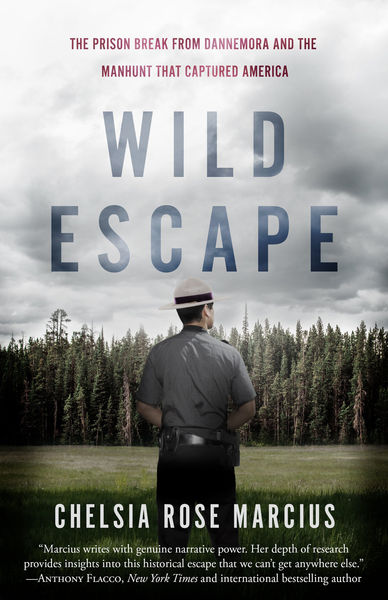Breathless tale of Dannemora escape

Former prison escapee David Sweat is led into the Clinton County Court in Plattsburgh in Aug. 2015 after being transported from Five Points Correctional Facility in Romulus for arraignment. Provided photo — Jason Cerone
Not many stories from the North Country garner national attention, but the escape of two convicted killers from a maximum security prison in 2015 captured the nation’s attention like few stories can.
While there are now a number of books recounting the escape and ensuing search, “Wild Escape,” by Chelsia Rose Marcius, offers the only first-hand account of the drama from one of the escapees.
In the summer of 2015, David Sweat and Richard Matt – two convicted killers detained in Clinton Correctional facility in Dannemora – popped out of a manhole in the sleepy town and triggered a massive search effort that saw hundreds of state police, forest rangers, sheriffs and other law enforcement scour the northern Adirondacks for more than three weeks.
Matt was killed in a gunfight with police, and Sweat was captured a few days later. Sweat was shot by a state trooper, but survived and is now incarcerated elsewhere in the state.
Marcius was granted interview time with Sweat, but couldn’t record or take notes during their conversations. But between his account, a comprehensive state report on the escape, and interviews with corrections officers, inmates and Matt and Sweat’s accomplice Joyce Mitchell, Marcius has pieced together an account unlike any other.

Marcius begins the book by introducing the characters in short chapters that flow pretty easily. Marcius connects the dots on the relationships between the three main players, Sweat, Matt and Mitchell. She describes how the prison worked for inmates like Sweat and Matt, and describes the ostensible love triangle between the three and the lapses in protocol by guards that allowed Mitchell to smuggle Sweat and Matt hacksaw blades, files and other tools.
“Since Matt first told her about the plot to escape, Joyce had satisfied their every request,” Marcius writes. “She had been the one to buy the hacksaw blades, chisel, drill bits, and steel punch, tools they needed to carry out the plan.
“She had agreed to pick them up outside the prison wall, and even said she would live with them in Mexico, or wherever they ended up. The fantasy had been all consuming: it had offered a reprieve from monotony, and a mental escape from small-town boredom. For six months the daydream had lived neat and nice in her head where all of its dire consequences could be ignored.”
Once the relationships and personalities are established and Sweat and Matt are outside the prison walls, Marcius tackles the extended search on a day-by-day basis with a breathless urgency that makes for an exciting read. She also provides insight into Sweat’s earlier life which provides context but tends to make the reader think Marcius sees him in a sympathetic light.
“David felt a warm liquid dripping down the back of his legs,” she writes of Sweat’s childhood in Binghamton. “He hopped off his red tricycle and climbed the steps of the crumbling concrete stairway that led to his family’s first-floor apartment …
“The next day it happened again, this time at school. David had not even noticed until several other students began to snicker. Pamela received a call to pick him up early. She took him home and told him to bend over. She raised the belt over her shoulder.
“David held back tears. None of this would have happened had they not moved to Binghamton and met Paul, the thin man who lived alone in the other first-floor unit of their house on Robinson Street
“He had been a welcome guest in their home. So when Paul had asked him to come to his apartment one afternnon, David readily accepted. He followed Paul to a bedroom in the back of the house. He asked David to lay down. David did as he was told. Paul rolled David onto his abdomen and slipped off his pants.
“The boy began to thrash.”
From Sweat’s account of the escape, Marcius puts the reader in the escapees’ shoes, while simultaneously conveying the stress and concern that locals felt while the search was ongoing.
“The hum of an engine from down the road interrupted his thoughts, and runied (sic) any chance that they would return that night,” Marcius writes of the pair’s encounter at a remote hunting camp. “An elderly man got out first. He looked from side to side, then toward the cabin door. His eyes narrowed as he roved over the camp. What he saw – or sensed, as there was nothing visibly out of place – caused his lips to purse, then twist into a grimace. He leaned inside the vehicle and grabbed his pump-action shotgun.
“Firearm in tow, he made his way to the tree in front of the cabin. He looked around for a moment, then reached for the trail cam. Holding the device, he pressed a small button to dislodge the memory card. Nothing came out.
“‘Someone’s been here!”
Wild Escape is an exciting read, even if you already know – or maybe lived through – the Dannemora prison escape. Marcius’ writing is easy to digest, and Sweat’s insights provide the most accurate portrait of what life was like for the two escapees while they were on the run.
Marcius’ experience with the written word combined with a naturally compelling story makes for a fast-paced book that can be enjoyed knowing Sweat and Matt were the first – and only – prisoners to escape from Dannemora.





